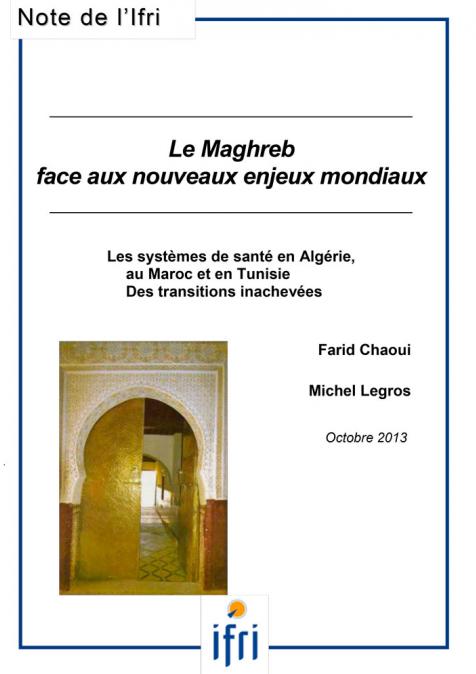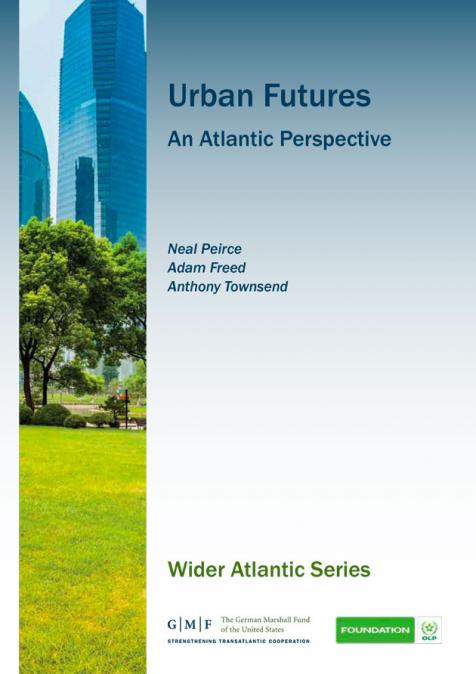RELATED CONTENT
-
AuthorsMichel LegrosFarid ChaouiOctober 1, 2013Pénuries fréquentes de médicaments, dépenses non remboursées, distances trop longues en milieu rural pour accéder à des services de soins, vétusté et inadaptation de certains équipements, les systèmes de santé des pays du Maghreb central traversent une crise. Si celle-ci n’est pas assez profonde pour constituer un ferment de révolte, elle s’agrège aux autres difficultés qui rendent la vie quotidienne parfois difficilement supportable et génèrent de nombreuses revendications en direc ...
-
AuthorsAbdeljalil AkkariJuly 1, 2013Cette étude retrace le développement des systèmes éducatifs au Maghreb et les principaux défis auxquels ils sont confrontés depuis les indépendances et établit les liens entre les révoltes et soulève-ments qu’a connus récemment la région avec les impasses souli-gnées dans ce travail. A partir d’un faible héritage colonial, le Maghreb a franchi un certain nombre d’étapes dans la construction de systèmes éducatifs susceptibles de relever les nombreux défis du développe-ment socioécono ...
-
AuthorsNeal PeirceAdam FreedAnthony TownsendJune 24, 2013This policy paper examines the importance of cities as global policy actors, innovators, and collaborators. While a global phenomenon, the authors of this paper identify specifically how the evolution of the importance of cities as global policy actors, innovators, and collaborators unfolds in the cities of the Northern Atlantic Basin versus the cities in the Southern Atlantic Basin. Despite the important differences between the cities of the Atlantic Basin, technology and the impa ...
-
AuthorsIsabelle Saint-MezardFebruary 1, 2013Ce travail s'intéresse aux relations entre l'Inde et le Maghreb, défini comme comprenant l'Algérie, le Maroc et la Tunisie, ainsi que la Libye et l'Egypte. L'objectif est, dans un premier temps, de comprendre comment l’accélération de la croissance économique indienne, manifeste depuis une dizaine d’années, se traduit dans les relations avec les pays du Maghreb et la sous-région d’Afrique du Nord. Il est, dans un second temps, d’étudier plus précisément la réaction de l’Inde face au ...
-
AuthorsAlice EkmanFebruary 1, 2013Ces deux dernières années ont été marquées par les mouvements de protestation dans le monde arabe. Ces mouvements ont été suivis avec la plus grande attention par les autorités chinoises, préoccupées à la fois par les conséquences intérieures, sur l’opinion publique et la stabilité politique du pays, et extérieures, sur les intérêts économiques et les ressortissants chinois présents en Afrique du Nord. Mais ces mouvements ont-ils changé la perception et les orientations stratégiques ...
-
AuthorsPaul IsbellDecember 1, 2012This policy paper argues that countries in the Southern Atlantic region are poised to become much more important players in the global energy trade. Recent changes in global geopolitics — including the emergence of the developing world and structural crises in the northern Atlantic — have collided with ongoing trends in the energy sector to transform the future prospects of the Atlantic Basin. Many of these energy vectors are either unique to the basin or are more advanced in the A ...
-
AuthorsEmiliano AlessandriWilliam InbodenDhruva JaishankarJoseph QuinlanAndrew SmallAmy StuddartDecember 1, 2012This policy paper examines the role of China and India in Latin America and Africa, and the implications for the United States and Europe. China and India have arrived as active players in the Southern Atlantic space. Their economic presence is expanding rapidly, with a focus on their acquisition of — and access to — raw materials such as fossil fuels, minerals, and agricultural commodities. The political and security implications of their arrival in the region is only now coming u ...
-
AuthorsJohn B. RichardsonArmando Marques GuedesXavier de la GorceAnne-François de Saint SalvyPaul HolthusNovember 29, 2012This paper examines the challenges posed by human activity on the Atlantic Ocean itself, and around its coasts, looking at it not so much as a vast expanse separating the Americas from Africa and Europe but rather as a shared resource and an important connector. All littoral states face a common challenge in maintaining its value as a foundation for sustained “blue growth” in the years to come. In Chapter 1, Armando Marques Guedes traces the evolution of the economic activities that ...
-
AuthorsIan LesserGeoffrey KempEmiliano AlessandriS. Enders WimbushFebruary 10, 2012This study argues that Morocco should encourage policymakers in the United States and Europe to think more imaginatively about its role in the Atlantic and elsewhere. Recent events underscore the reality that stability in Morocco’s neighborhood cannot be taken for granted. The implications of protracted instability in Morocco’s near abroad — the Maghreb and West Africa — would be substantial, adding to the opportunity costs of poor integration in the region, and strengthening the l ...
-
AuthorsJoe GuinanKatrin A. KuhlmannTimothy D. SearchingerJanuary 26, 2012This paper looks at three ways to promote food security in Africa. Having first introduced the issues, this paper brings together an expert group of authors to look at three ways in which critical linkages should be made in efforts to promote food security in Africa. Katrin Kuhlmann examines the African “Development Corridors” movement, which consists of using existing roads and railroads that link mines and other investments with regional markets and ports to bring farmers into a ...











